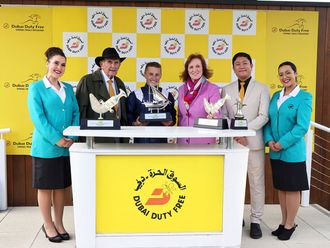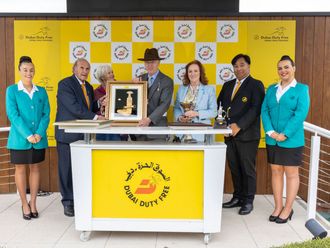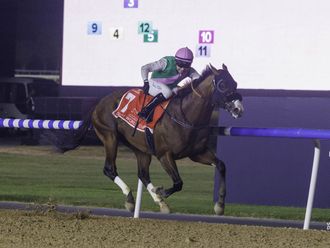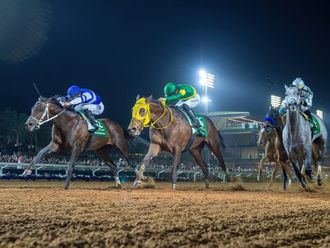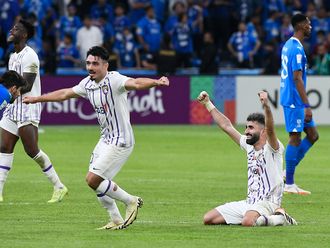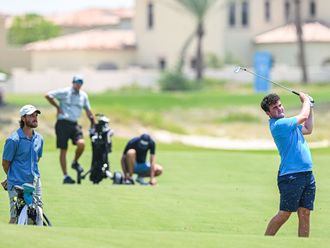Dubai: Many aspiring young jockeys dream about winning the Derby or the Dubai World Cup, but only a small percentage have any idea how to achieve such a goal.
Yasir Mabrouk, the Emirate Racing Authority’s (ERA) Master of Apprentices, has been tasked with identifying talent in the UAE and nurturing them to become accomplished riders, if not Derby winners.
How do you get started if you want to become a professional jockey, and how do you attain an initial apprentice license ? Mabrouk had most of the answers when he spoke to Gulf News about the challenging programme that he has been in charge of for the last 10 years and the process that a youngster has to go through should he want to achieve success in the sport.
Gulf News: Can you tell us what your role is as the ERA’s Master of Apprentices?
Yasir Mabrouk: The job that I have requires you to be many things, but mostly you must have an eye to identify suitable candidates and be able to pick youngsters that meet the criteria in weight, height, attitude and temperament. In short, you must be able to spot if he has what it takes to become a jockey.
What is unique about this job, can you describe the mentoring process?
When we first started this programme, we knew it was a challenge. Most jockeys in the world are usually born into an equine family or have some sort of connection to the sport. In the UAE, you don’t find that many youngsters wanting to become jockeys with this kind of background. Most of them come from endurance, which is okay. So we don’t have the advantage that they have in say countries like Ireland which is one of the biggest producers of jockeys in the world. I remember when we started we had Ahmad Ajtebi who came from a camel background, so it helped. He was a bit of a natural when he sat on a horse. And he has gone on the become a highly successful jockey.
Where does it all begin?
It is a bit of a lengthy process. We start by sending them to a riding school where they first learn how to sit on a horse and do a little bit of hacking. We then go through the process of sending them to trainers where they are put through the basic stable routine that will give them more experience about horses and help them develop skills that they will require when they are actually riding a horse.
What happens next?
When the Master feels they are ready, they are put through some barrier trials along with senior jockeys. And if they pass that test then they are granted an apprentice license, or a conditional license as the case may be. After that, if their Master finds they are ready he puts them in a race, which is usually one over a straight course. As their confidence grows and they acquit themselves well they are allowed to ride over the bends. During this period the feedback we receive from the senior jockeys is very important, because they are the ones in the best situation to assess the jockey riding next to him and how he handles a race. They kind of help us to give a jockey the green light and we go on from there.
What is the key at this stage in their development?
Experience is the key. We send our apprentices abroad so that they will find out more about stable work. We have a good relationship with the Racing Academy and Centre of Education (RACE) in Ireland and send most of our youngsters to them for training. When they come back we evaluate how developed they are and what progress they have made before we send them back to a local Master.
Can anyone who meets the criteria become a successful jockey? What guarantees are there?
I don’t think in any sport, you could make a sportsman. The talent has to be there, the gift and then it can be developed.. The talent, the background, the commitment are very important. You could have the talent but if you don’t have the commitment it would be a waste of time. It is a combination of all this but the talent has to come first.
How do you measure success? What is the fundamental ingredient to the programme ?
The most important thing for me is commitment. To be a jockey you have to make a lot of sacrifices. It’s a professional job, it’s not a hobby. On of my main jobs is to motivate them, trying to get them to accept the lifestyle of a jockey which is unlike any other sportsman. It is very demanding – you have to be prepared to work very hard, look after your health, work on your fitness level and keep strange hours.
Your day usually starts at 3-4am; there are a lot of sacrifices to be made. You will not have as many friends, because of the timing that you keep. Your friend is your job. It’s not a one time thing, it’s for life, at least for the next 20 years or so. In return, if you succeed you will get fame, media attention, money, excitement but you have to commit first and look for the results in the long run.
What are some of the non-racing things you like to do. How do you relax?
I am a sportsman by nature. I played football at the highest level, did a bit of basketball and I love reading. But in general sport is my thing I could sit and watch a tennis, cricket or football match for hours.
If a youngster said he wanted to become a jockey, what advice would you give him?
I keep repeating this word all the time – commitment, commitment, commitment. I will tell them don’t waste your time and others time if you cannot commit. Some may expects results immediately others will get fed up if they don’t succeed. I would say get ready for some real hardship. It’s not what most people may think – you ride a horse, win a race then make it to the front pages of a newspaper. That’s not what happens. You have to be patient and honest to yourself.
You’ve seen some good jockeys come through the programme, like Ajtebi and Saeed Al Marzouei, but what will really make you happy?
To see more jockeys coming through. But what I really want to see from these young boys is commitment. The success will come later.


